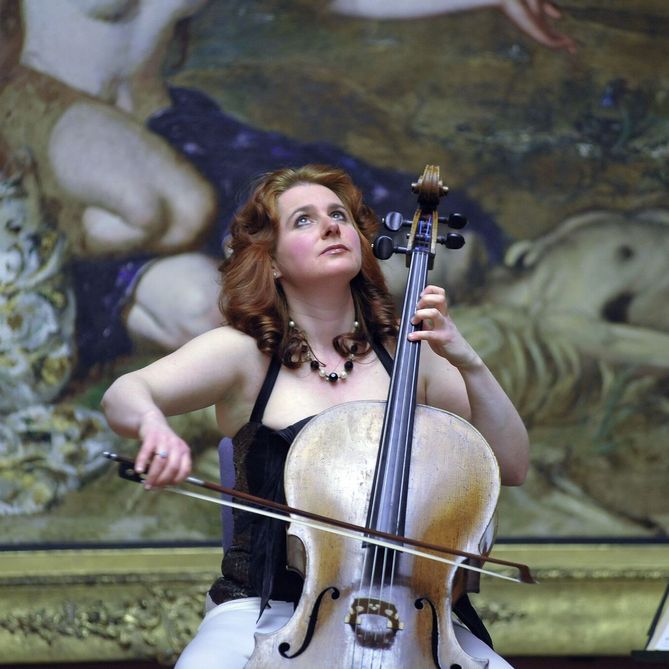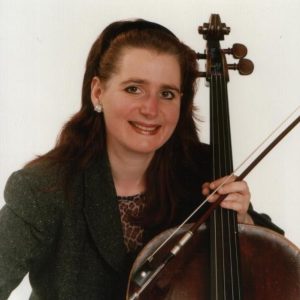
Hannah Roberts on her Teaching Philosophy
Hannah Roberts
Reprinted with permission from Aitchison Cellos.
‘It’s such a privilege to be involved in the evolution of another person’s progress and the benefits of this stimulating process are mutual. You learn as much as you give. The essence of it however, remains the same: sensing as much as you can about the other person’s thought process and their way of understanding is the key to being able to help them. That is the cornerstone, whether in a consultation lesson or working with a long-term student. You are constantly trying to sense what the person needs at that stage and how they are processing what you are trying to give them. Are they able to utilise it there and then? Or are you sowing the seed of the idea that may mature or re-surface later?
‘What excites me about the potential of a student, in addition to innate ‘giftedness’, is their thirst for learning, exploring and self-improvement. I want to see signs of self-motivation born of a deep love of music, as well as a genuine fascination with the craft of playing the instrument. I’m not so drawn to work with students who are just content to soak up what I say. The potential for conversation, a bit of repartee even, and an open but independent mind are all healthy ingredients in the learning process. When working with a talented student you are dealing with something very precious. It is essential to gain the student’s trust that you’re not attempting to diminish or damage the potency of their gift.
‘For a young player to whom everything has come very naturally from childhood, it can initially feel that if a teacher focuses stringently on detail, this may diminish their spontaneity and flow. For example, if you feel that someone needs to work on their bow hold, you need to demonstrate the future advantages of a changed bow hold, instead of merely showing what’s wrong with the existing one. Once you gain the trust of the student that you are there 100% because you want them to improve, they can accept the compatibility of your guidance with the shared goal of their ultimate progress. There is no one-size-fits-all in cello teaching. Every student has a different physique and a different personality and it’s essential to work with each student on an entirely ‘tailor-made’ and individual basis.
‘If someone has a major problem that pervades all of their playing, such as a collapsed left elbow, they definitely need some exercises that allow them to focus almost exclusively on that. There is no point trying to reinvent the wheel; there are some technical matters that we know are good practice, for example not having your left elbow too low when you go up above thumb position. It is good to be clear which issues are subject to an individualistic approach and which aspects of the instrumentalist’s playing discipline are best served by existing exercise books and materials which can then be adapted to specific circumstances.
‘So, to focus on the left elbow, we would look for simple exercises that already exist, for example in Feuillard. But I am also very keen that students come up with their own exercises, because it’s so important to maintain creativity in practice. You need a very solid goal and then to be inventive in adapting and developing existing exercises for yourself. I often advise students to imagine they were trying to help someone else with a problem – how would they approach it? Which aspects would they emphasise? And how would they make the message clear for the other person? Using this thought process, they often clarify what they need to do for themselves and identify the simple nuts and bolts that form the problem.
‘The interaction between my personal practice and teaching is very strong. Teaching is a real challenge and I’m always asking myself, how can I put this point across in a way that will unlock this student’s problem? When I’m teaching, I often demonstrate to students the ‘bad’ way and the ‘good’ way of doing something and to do this, I really need to have crystallised for myself what elements each consists of – and I explore this in my own practice. Often through that process you find the nugget that’s going to help the student: which physical feeling it is that you are asking them to find or change. There’s no doubt that teaching continually informs my playing and my learning process.
‘I hold a performance class with my students almost every week. There are so many benefits to these classes because they provide a natural, rotating experience of performing and giving feedback to other performers. Students also get to see when someone has made progress because they have put more work into their preparation, which leads to a very healthy, mildly competitive ambience created by the students!
‘I usually pick four people to perform each week, so that one week you will be in the spotlight – whether you like it or not! – and the next week you will practice how to offer comments which will help that week’s performers the most. In class, I offer my feedback to the performer first and then invite the other students to contribute their ideas. I try to foster a culture of trust and mutual help in the way I put my comments as a teacher in front of the group. The comment should always have the end goal of helping. Of course, it’s important to be honest and to say something critical, to help them to improve, but you also need to give the student the tools with which to pick themselves up and, ideally, make most of that improvement there and then.
‘If a student has a problem with wobbly vibrato and the group sees a teacher repeat over and again ‘you have wobbly vibrato,’ it doesn’t help them to know why the vibrato is too wobbly or what could be done about it. Whereas if you say, ‘I think we need to explore the balance of the left hand and what it is that underpins the vibrato. Let’s try it without any vibrato and see whether you are honestly balanced when you shift onto the 3rd finger,’ – this is a different and hopefully, constructive way of arriving at the point. Of course, there is the risk that in the class situation a student may make a point in an undiplomatic way, but I have found that most students quickly adjust to the culture of the class and learn a lot about how to effectively share ideas and opinions to the benefit of their peers. The whole process is a learning experience for the entire group.
‘As a teacher, I hope to foster inquisitive, intelligent and generous musicianship. I try to help my students to develop tools as well as an ever-expanding manual on how those tools can be used in their playing. I encourage them to question and investigate, to be creative and imaginative in their approach to technical and musical matters, making connections between issues rather than separating them. Above all, I hope that my students will become generous musicians. Generosity of spirit is essential for music-making to be of any value – and for it to transmit the music effectively to the listener. For me, that is at the core of what it is to be a musician.’
Copyright 2019 Aitchison & Mnatzaganian | All Rights Reserved
Subjects: Artists
